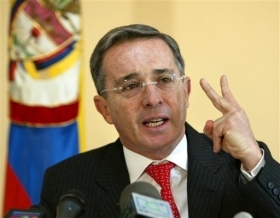Argentine authorities disabled an explosive device apparently aimed at Colombian ex-President Alvaro Uribe, who is currently visiting the country, days after one of his former ministers was the target of a bomb plot in Bogota.
Two bombs were discovered hidden inside ceiling lights in the Gran Rex Theatre in Buenos Aires on May 22. The devices were due to detonate at 4:30 p.m. Wednesday when Uribe would have been there attending a cocktail party, reported La Capital.
Judge Norberto Oyarbide told press that the device was strong enough to have killed several people in the room, though federal police said it would only have caused a minor blast.
No one has claimed responsibility for the bomb. President Juan Manuel Santos will send a team from Colombia headed by police chief Oscar Naranjo to help Argentine police investigate the incident.
The attempted bombing comes a week after an assassination attempt against Uribe’s former Interior Minister Fernando Londoño, with a bomb attatched to the side of his armored vehicle. Though the Colombian government has yet to name a culprit, Londoño has been outspoken in his belief the Revolutionary Armed Forces of Colombia (FARC) were behind the attack.
Uribe has so far refrained from speaking about the Buenos Aires bomb, announcing that he would attend the event as planned.
InSight Crime Analysis
Authorities have not yet said who they suspect of placing the bomb, and Uribe’s list of enemies is long.
Primary among the possible culprits is the FARC. During his presidency, Uribe orchestrated a massive offensive against the Marxist rebels, helping to cut their numbers from 20,000 to around 8,000.
It would not be the first time the FARC have targeted Uribe. In April 2002, prior to his election, Uribe survived a blast that killed three people when guerrillas detonated a bomb next to his armored campaign car in the city of Barranquilla. Two years later Colombian intelligence reportedly intercepted FARC communications with orders to focus on assassinating the president.
Though the FARC have no notable presence in Argentina, the group released a propaganda video in the country in 2009 that showed the guerrillas financing their insurgency through agriculture rather than extortion or the drug trade. Uribe angrily rejected the film, stating the only thing the FARC plant “is anti-personnel mines.”
Another possibility, for both the Buenos Aires and the Bogota incidents, is that right wing groups are to blame. Now-demobilized paramilitary organization the United Self-Defense Forces of Colombia (AUC) had a fractious relationship with the ex-president, following the abrupt extradition of 14 of its former commanders to the US in 2008.

